Resting
Foreword
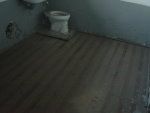
(The cell)
(picture source:photo by this team) For normal people, the time for resting and entertainment are indispensable; this is true for inmates as well. They have less freedom than we do, and they are desperate for their brief spells of being outside. However, inmates did not have such time for rest and entertainment from the start. Under Japanese rule, the prevailing view was "retribution," which deems prison time as deserved by the inmates; it was concerned with authoritarian management, only incarceration and not human rights. Under Nationalist rule, it slowly turned from "retribution" to "education." Prisoners were taught according to the law and there was a respect for humanity. Prisoners come to prison from various dark corners of society, and it is necessary to educate them so they can return to society after they serve their terms. They can discover their own values, use their abilities, and bring their own lives back. Due to the promotion of such educational views, inmates begin to have rest and leisure.
Going outside, resting
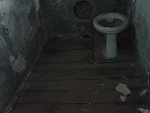
(The cell)
(picture source:photo by this team) Inmates spend most of their time inside their cells other than working at the factories. At the Old Prison, under the Nationalist government, they would have fixed time for exercise, once a day, thirty minutes to an hour each time. They can exercise on the field based on units of the auditing room, factory, or cell block and based on sequences on the timetable. As for activities arranged by the prison administration, other than exercise, sometimes there are movies at the Jih-Hsin Hall, and sometimes there are academic groups or religious groups that conduct performances or counseling at the prison. This can provide emotional satisfaction to the inmates (seeing children is like seeing their own children; if they can see people outside of the tall walls, they are less likely to feel totally isolated, and so on), but these events are not frequent.
During holidays, since some people on the managerial staff have time off, due to limits in human resources, inmates can only remain in their cells. However, if there are continuous holidays of over two and a half days, the staff is requested to take overtime so that inmates can bathe and exercise. Under the authoritarian management during Japanese rule, this was overlooked; they did not make explanations even though inmates died during longer holidays.
Visitation
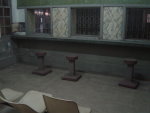
(The interview room)
(picture source:photo by this team) If a married couple enters prison at the same time, both members of the couple can request visitation. Under the Nationalist government, there were different ranks that permitted different number of times for visitation; level four was once a week, level three was twice a week, level two was once every two days, and level one was once per day. Prisoners begin at level four when they enter the prison. Other than couples, other prisoners can be visited by their family members, the ranking model is the same as the above, but the types of relatives were different. For level four, they can only see cousins or more closely related relatives, level three can see friends and mail letters in addition to the added times, and levels two and one both have added times. Visitations allow inmates to see relatives and friends to calm their spirits.
Night study
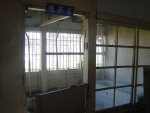
(Smoking area in the factory)
(picture source:photo by this team) On the timetable, there is so-called "night study time." During this period, inmates remain in their cells. They can do anything except what violates rules. Some inmates use this period to read and learn on their own, while other inmates rest and sleep early. Later in prison development, the prison began inviting teachers to teach the inmates who have been teaching themselves; this is the period before the Open University they have now. Other than this, inmates who want to smoke are allowed to smoke in the smoking area in the bathroom after meals; they can only purchase cigarettes at the co-op, but they can only buy two packs at a time, and the cigarettes are kept by the prison staff.
Conclusion
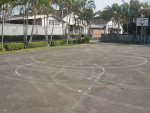
(The play ground)
(picture source:photo by this team)
Sources:
-
Researched and organized by this team
-
Interviews with Ms. Chiu Mr. Lee
